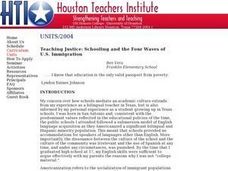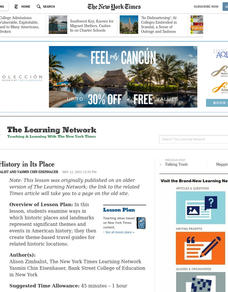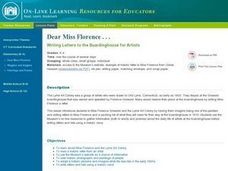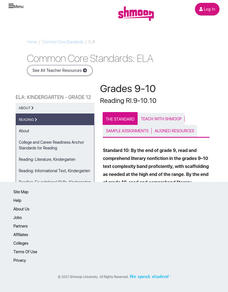Curated OER
Reasons for Settling the New World
After studying the reasons settlers entered the New World, primary learners try to persuade others to enter this new land. Class members present their arguments in a variety of ways including posters, writings, and charts. Richly...
Curated OER
Butterflies, Butterflies, Butterflies
Transform your class into a butterfly museum! Research different types of butterflies, their habitat, and life cycle. Interactive components such as PowerPoint presentations, Claymation movies, and webpages add pizzaz to the museum...
Curated OER
Ben Franklin Timeline
Celebrate inventions such as lightning rods, bifocals, and stoves with a Ben Franklin Day. Young historians conduct research and write a paragraph about an accomplishment of Benjamin Franklin including an illustration or collage that...
Curated OER
In God We Trust; All Others Pay Cash
Learners review their knowledge on the First Amendment. After reading an article, they identify specific church and state issues. Using the Internet, they research President Bush's proposal from a specific point of view. They summarize...
Curated OER
Gaining Perspective
Discuss race in the United States. Start by having each learner read a copy of Martin Luther King Jr's famous speech, "I Have a Dream." Then, have them read the article "Shared Prayers, Mixed Blessings" about a church in Atlanta,...
Curated OER
A Duck's Bill on Capitol Hill?
Use a list of environmentally related words to engage learners in a discussion about ecosystem conservation legislation. As a class, read "Aware of Political Ecosystem, Property Rights Advocate Embraces Conservation Plan." Then, present...
Curated OER
Justice Is Blind, Colorblind That Is
It's so interesting to see kids respond to articles about education. To start the day, prompt learners to discuss the words colorblindness and diversity. Then, split your class in two and have one side read an article from 2007 and the...
Curated OER
Science-Observation Skill Builders
Pupils explore observation while making connections between observation skills and careers (like how farmers observe the weather). They view a variety of nature photographs on the computer and practice their observation skills by...
Curated OER
Ecuadorian Rainforest
Have your class talk about the importance of the rainforest and the products that come from it. Learners watch a video showing the path of chocolate from the rainforest to the supermarket. They discuss how the rainforest and chocolate...
Curated OER
Discovering Saturn, The Real "Lord of the Rings"
Reading, writing, and rings! A lesson plan from NASA combines space science with authentic reading and writing tasks. Included in this lesson plan are pre-reading activities, four mini informational booklets on Saturn, a structured...
Curated OER
Teaching Justice: Schooling and the Four Waves of U.S. Immigration
U.S. immigration is the focus of a unit on social justice. Over the course of a school year, young historians read a variety of texts to learn about four waves of immigration that have occurred over time in the U.S. An emphasis on...
Curated OER
What Has Brown Done for You?
Learners review the facts of the court case Brown v. Board of Education. Next, they research recent court cases that uphold contrasting views on the landmark decision. They write opinions about these recent court cases from a 1954...
Curated OER
The Fabric of History
African-American history is an integral part of what America is. Learners examine important events, read informational texts, and create quilts depicting specific eras in African-American history. Each image created for the quilt will be...
Curated OER
Putting History in its Place
Examine ways in which historic places and landmarks represent significant themes and events in American history. Then create theme-based travel guides for related historic locations. This lesson plan requires informational reference...
Curated OER
Active Reading with American History
Explore connections within and between informational texts with this lesson about encyclopedia articles. Middle schoolers write encyclopedia articles focusing on topics in American history. They discuss how to determine credibility...
Curated OER
Dear Miss Florence: Writing Letters To the Boardinghouse for Artists
Imagine being one of the painters in 1910 at the Lyme Art Colony in Connecticut. Using the Florence Griswold Museum's on-line resources to gather information about the daily life of artists at the boardinghouse, learners write a letter...
Curated OER
Writing a Historical Poem
Students work together to research a historical event. They create their own poems based on their research. They share their poems with the class and discuss the historical event further.
Curated OER
Black Power
Use this New York Times lesson to research contemporary leaders in the African-American community. After reading the article "Blacks Weigh the Impact of the Post-Jackson Years," middle and high schoolers discuss the varying viewpoints of...
Curated OER
Bombs Away!
Examine the different perspectives on the future of United States Navy bombing exercises taking place on Vieques, Puerto Rico with this lesson from The New York Times. Here, young learners read "Islanders to Vote on Vieques Bomb Drills,"...
Curated OER
Lovely Ladybugs
Make cute ladybugs with egg cartons and pipe cleaners! After you read some facts about ladybugs, use different materials to make some ladybugs for your classroom.
Edmond Public Schools
SOAPSTone
Break an article down with a SOAPSTone chart. Class members determine the speaker, occasion, audience, purpose, subject, and tone. The chart includes a question for each of these elements, provides some clarifying text for each, and...
Polk Bros Foundation
How to Summarize a Non-Fiction Passage
After reading a text, one way to find out how much your class comprehended is to ask your pupils to summarize. This worksheet helps class members prepare for writing a summary of a nonfiction text. They note down the topic, up to eight...
EngageNY
Reading Maps: Locating the Countries We Have Been Reading About
Show your class how to read a map and decipher all of the markings and features. Start out by connecting maps to their homework from the night before and their current reading, in this case That Book Woman, and a related informational...
Shmoop
ELA.CCSS.ELA-Literacy.RI.9-10.10
Make sure that your pupils have mastered complex literary nonfiction by the end of the year and use this resource to help get them to that point. After a brief description of the Common Core standard, a list of age-appropriate...

























